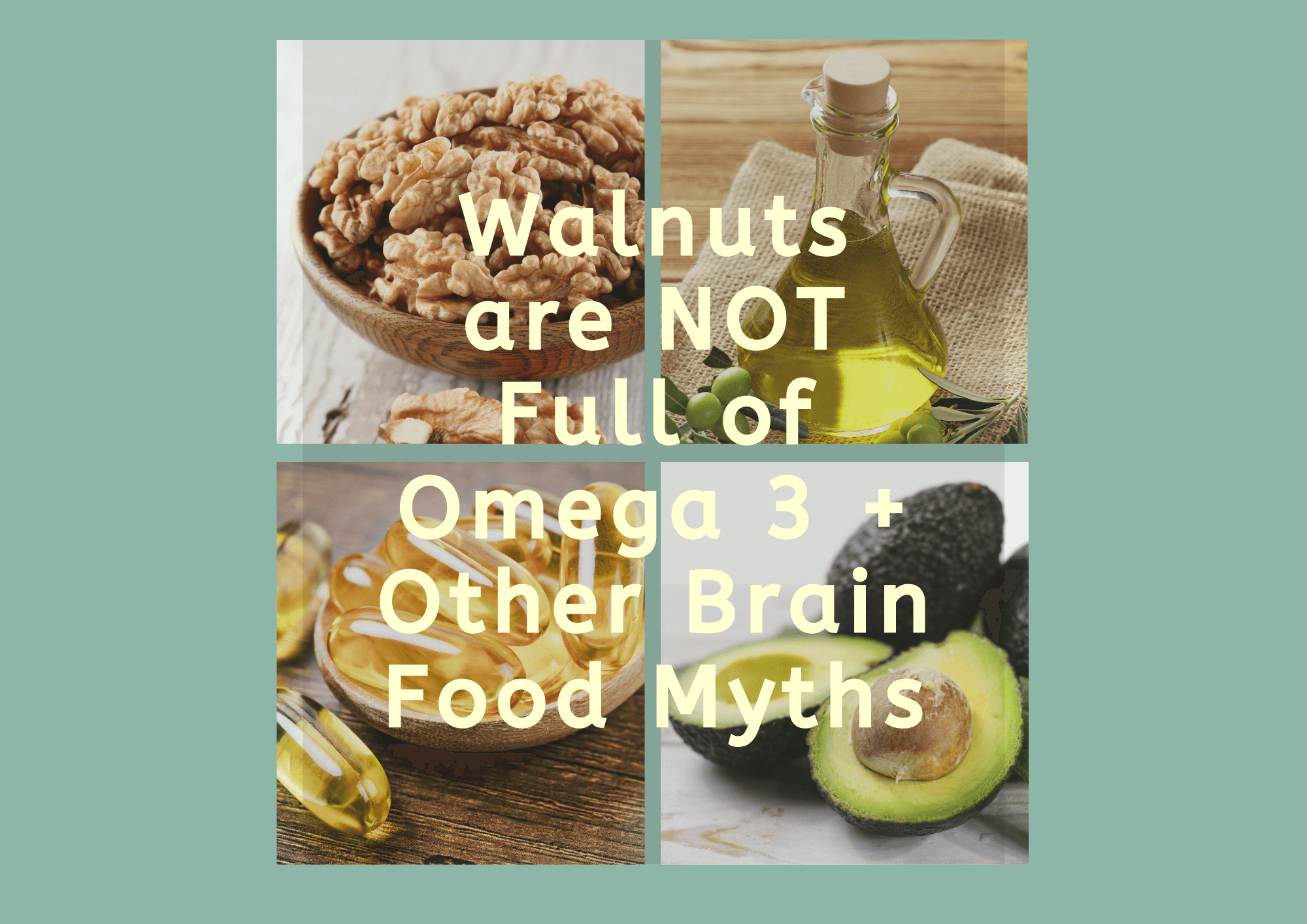Four brain food myths have become pervasive beliefs. They’re persuasive because there’s a grain of truth in each of them.
Here are the facts:
Walnuts have long been promoted as being a great brain food due to their supposedly high concentration of omega 3 fats.
Maybe this assumption developed from the visual similarity between the two hemispheres of the walnut and the left and right hemispheres of the human brain.
However, walnuts are not especially rich in omega 3 fats, and are primarily composed of omega 6 fat, some omega 9 and lastly omega 3, at between 5 and 10%.
Walnuts do however contain other nutrients that support brain health, such as:
• vitamin E
• some B vitamins
• iron, selenium and zinc
The relatively greater content of omega 6 to omega 3 doesn’t mean that walnuts are not great brain food. In fact, we need omega 6 for specific brain functions, just as we need omega 3 for other brain functions.
So, walnuts are great brain food, but not because of their (supposedly) high omega 3 content.
Olive oil is the oil used in Mediterranean style meals, and by many people who have been told it’s a healthy oil – maybe even the only oil - to include in their diet.
Evidence is growing that following a Mediterranean dietary pattern supports healthy cognition across the life span, including a stable mood.
Maybe this is why olive oil is believed to be the best oil with which to support brain health.
Olive oil contains mostly monounsaturated fat, also known as oleic acid, or omega 9. This is a type of fat that we can and do synthesize from carbohydrates.
It’s therefore not essential for us to consume in our diet, unlike omega 3 or 6 fats, which are essential fatty acids (EFAs), meaning we can only obtain them via dietary sources.
However, olive oil does contain other nutrients, all of which support brain health in a variety of ways, such as:
• Vitamin E and Beta-carotene (or pro-Vitamin A), both antioxidants
• Magnesium-rich chlorophyll
• Phytosterols, such as beta-sitosterol, which blocks excess cholesterol from being absorbed
• Polyphenols, such as oleocanthol, a potent anti-inflammatory agent and hydroxyturosol, also a potent anti-oxidant and anti-inflammatory compound, with anti cancer properties.
So, the benefits that olive oil provide for brain health are related to its potent, but minor ingredients, not to the type of fat that it contains.
Click this link for a detailed blog post about olive oil, how to choose the best kinds and how to, and not, use olive oil.
Fish Oil
The consumption of fish oil has become synonymous with supporting brain health. There are however a few misconceptions about fish oil:
• Most people believe that the specialized fats in fish oil, docosahexaenoic acid (DHA) and eicosapentaenoic acid (EPA), can only be provided in this form. However, we can convert plant forms of omega 3 to these specialized forms if we have enough of some specific nutrients required for conversion.
• In the processing required to produce fish oil, and remove heavy metals, polychlorinated biphenyls (PCBs) and dioxins that are present in fish today, the oil is heated to high temperatures. These highly specialized fat molecules, DHA and EPA, are very sensitive to light and high temperatures, and when exposed to such many changes occur to these fat molecules. Trans fats, polymerized fats and cross-linked fats are some of the damaged fats that are created during processing and storage.
• Labelling regulations do not stipulate that toxic fats be listed on fish oil products, so consumers are not aware of the toxic fats present or the oxidation that occurs in such products.
So, although you may receive some benefit from using fish oil supplements, in the form of DHA and EPA fat molecules that may remain undamaged, you are also consuming many toxic fats inadvertently.
Avocados are also regularly promoted as being a fabulous brain food because of the fats they contain. However, they don’t contain much EFAs, but do contain omega 9, like olives.
However, they are full of other great brain friendly nutrients such as:
• Vitamins, such as A, C and E as well as B1, B2, B3, B5 and B6
• Minerals such as folate, iron, magnesium, and potassium
Therefore, like the other foods mentioned above, luscious avocadoes are not brain foods due to their fat content, but due to the other nutrients they contain in abundance.
Conclusion
Relying on any specific food in isolation, or dietary supplement, to support optimal brain function and prevent cognitive decline is a useless endeavor.
A complex, varied, nutrient-dense, fibre-filled diet, with a focus on seasonal produce, taking into account our energy requirements, age, gender, and genetic predispositions, is required to satisfy the needs of our energy demanding, sensitive and sophisticated brain.
With that as the solid foundation, evidence-based dietary supplements can be added if required.
References
Erasmus, U. (1993). Fats that heal, fats that kill. Alive Books. Burnaby BC, Canada.
Halvorsen BL and Blomhof R. Determination of lipid oxidation products in vegetable oils and marine omega-3 supplements. Food Nutr Res. 2011; 55(1).
List G. R. (2016). Oilseed Composition and Modification for Health and Nutrition. In T. A. B. Sanders (Ed.), Functional Dietary Lipids: Food Formulation, Consumer Issues and Innovation for Health (pp. 309). United Kingdom: Woodhead Publishing.
McCabe, D. (2016). Feed Your Brain. 7 Steps to a Lighter, Brighter You! Sydney, Australia: Exisle Publishing.
Tuck, K. L., & Hayball, P. J. (2002). Major phenolic compounds in olive oil: metabolism and health effects. The Journal of Nutritional Biochemistry, 13(11), 636-644.
Turner R, et al. Are the health benefits of fish oils limited by products of oxidation? Nutr Res Rev 2006 Jun; 19(1): 53-62.
Turner, R., McLean, C. H., & Silvers, K. M. (2006). Are the health benefits of fish oils limited by products of oxidation? Nutr Res Rev, 19(1), 53-62.
Velasco J, et al. Heterogeneous aspects of lipid oxidation in dried microencapsulated oils. J Agric Food Chem 2006 Mar 8; 54(5): 1722-9.
https://fdc.nal.usda.gov/fdc-app.html#/food-details/170187/nutrients (cited 2 July 2022)
https://fdc.nal.usda.gov/fdc-app.html#/food-details/171413/nutrients (cited 2 July 2022)
https://fdc.nal.usda.gov/fdc-app.html#/food-details/171705/nutrients (cited 2 July 2022)





